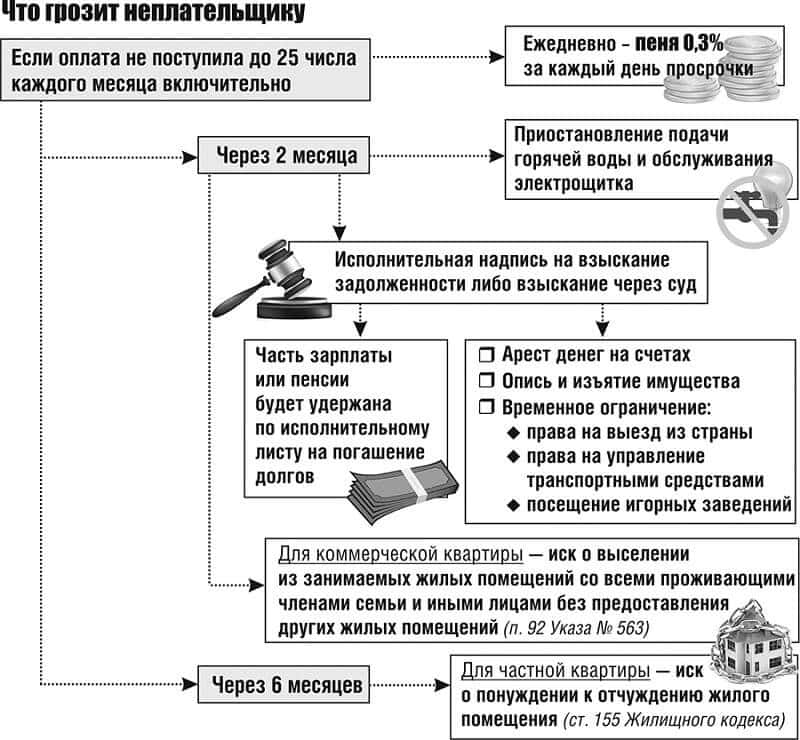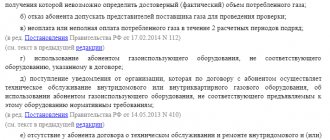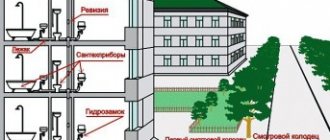Legal provisions
Many people want not to pay penalties on receipts received for housing and communal services. This desire may be based on a person's financial situation or a violation of his rights. However, a citizen must comply with the rules for using public utilities, since when purchasing living space, an agreement is signed with the housing and communal services, which includes the terms of service. In 2020, changes were published regarding the accrual of penalties and the statute of limitations for such cases was determined.
If there are any misunderstandings with the housing office, then you should write a letter of claim and fill it out correctly; the lawyers of our portal can help with this.
Only documentation can achieve the truth.
Regulatory acts
To get rid of debt, one desire is not enough. Housing Code of the Russian Federation No. 155 reports that a citizen is obliged to pay for utilities. These funds must be transferred to the balance sheet of the management organization in a timely manner in accordance with Article 153 of the Housing Code of the Russian Federation. And also deposit funds in accordance with charges and established tariffs (157 Housing Code of the Russian Federation). Penalties for housing and communal services can only be written off on the basis of the law. To do this, you need to draw up an application and submit it to the relevant authorities.
Situations are different, and if a person has a debt, this does not mean that he is a willful defaulter. By law, housing and communal services can forcibly recover this money through a lawsuit or offer an alternative. For this purpose, restructuring is envisaged, the forms of which will be discussed below.
By government decree, it was decided that suppliers of utility resources may refuse to provide services to those apartment buildings that do not pay. The issue can be resolved in court, according to Art. No. 350 of the Civil Code of the Russian Federation. This law provides grounds for taking tough measures. Article No. 317 of the Civil Code of the Russian Federation allows the calculation of penalties, and in the provisions of Art. No. 332 of the Civil Code of the Russian Federation states that in addition to penalties, the accrual of a penalty is allowed.
Note: authoritative legal publications such as Kommersant state that most of these laws are being revised and changes will be made in the near future.
Watch the video: “How to legally avoid paying housing and communal services debts.”
Changes in accrual of penalties for utility bills in 2020
The changes that have already been approved mostly concern certain categories of citizens. For example, low-income families who are not able to fully pay off their utility debt for an apartment.
However, no one will allow them not to pay penalties for utilities at all, but some relief is provided in the form of subsidies. To avoid the accrual of penalties, citizens now have the opportunity to write an application to the Housing Office. If the department considers the reasons compelling, it may suspend penalties and grant a deferment of payment.
The tariffs for the services provided, as well as the accrued interest rate, have also changed. The statute of limitations now expires from the moment a person stops paying rent. Penalties begin to accrue only when funds stop arriving for more than 30 days.
Example: debt 5000 rubles. Penalties – 5,000*0.11*1/300 = 1.8 rubles. per day until a letter of claim is submitted or full or partial repayment is made.
How can you avoid paying rent penalties?
In the process of debt collection, along with penalties, the main role is played by the agreement, which is drawn up between the owner of the property and the management company that provides utilities for residential premises.
Legal rights to refuse
The Law on Rent Debtors, which was adopted in 2020, states how penalties should be collected, and in particular states that they should be calculated on the total amount of debt for each day of late payment. It is worth noting the fact that the maximum permissible percentage is also determined, and it is 1/300 of the refinancing rate adopted by the Central Bank.
- application for recalculation - such a document must be submitted to the service organization no later than 30 days after return or before departure. Payment amounts may be reduced for a period of 6 months. If this time is not enough, you will have to repeat the application;
- papers confirming the fact, reason and time of absence (copies or scans of tickets, travel certificate, etc.).
- death of a debtor tenant, as well as liquidation of a legal entity that received utility bills;
- lapse of time;
- declaring the debtor (individual) bankrupt;
- the inability of bailiffs to implement a court decision in practice.
Rent reduction when tenants are away
In case of late payment of housing and communal services receipts or non-payment, the accumulation of the amount of the penalty, called the term “penalty”, begins. However, some categories of citizens are allowed to write off penalties or significantly reduce their size.
- The amount of debt for housing and communal services as of February 10, 2020 is 2300.00 rubles. Of these, 1100 rubles. — for January 2020 and 1200 rub. for December 2020.
- Payment was received on the 19th of the same month.
- Number of days overdue: 9 (11th, 12th, 13th, 14th, 15th, 16th, 17th, 18th and 19th).
- The calculation of penalties will look like this:
- 1200.00 * 0.11 / 300 * 9 = 3.96 rub.
- Second example:
- The amount of debt for housing and communal services as of March 10, 2020 is 8571.28 rubles. Of these, 701.27 rubles. for October 2020, 1650.88 rub. for November 2020, 1971.01 rub. for December 2020, 2096.50 rub. for January 2020 and 2151.62 rubles. for February 2020.
- Payment was received on the 15th of the same month.
We recommend reading: List of Documents for Registration of Benefits for a Labor Veteran in Kursk
Deadlines for payment of housing and communal services according to the law
In order to write off penalties for utilities and not wait for the moment when penalties begin to accrue, experts recommend paying off the debt within three months. There are several illegal ways of leveling, but this path will be wrong, because by the end of the reporting period the program will reveal errors in the balance sheet, and the audit will find the one whose debt is unpaid.
To avoid penalties, payment must be made within 30 days of receipt of the receipt. Otherwise, in addition to penalties, gas, water or electricity may be turned off.
Note: for the first 3 months the rate is 0.003%, then 0.013%.
Penalty for late payment of housing and communal services for individuals depending on the term of the debt
Responsibility and consequences for late utility payments
Utilities are obliged to provide services within the framework of the concluded contract, and citizens are obliged to pay for them. You can appeal or cancel penalties for utilities only if there is a serious reason. Otherwise, the resource supplying organization or management company has the right to sue the magistrates' court, and payment will have to be made with all fines according to the writ of execution.
Compulsory collection gives complete freedom to bailiffs. They are empowered not only to seize property, but also to describe household items and vehicles. A person may lose his home, which will be sold at auction and the premises will be provided to him minus the amount of debt.
A delay of more than 6 months is already considered a malicious administrative violation (Article 15.26.4 of the Code of Administrative Offenses of the Russian Federation).
Obligation by law to pay penalties for housing and communal services
Federal Law No. 188 dated January 22, 2019 covers the responsibilities of citizens to pay bills, and he cannot refuse or write off penalties on housing and communal services debts without good reason. The accrual of penalties can only be canceled if you send an application to the management company.
In a situation where such a measure has no effect, it is worth preparing a statement of claim. Only with this approach can one insist on recalculation or relaxation.
Virt laser
You need to pay for the services of utility companies, but if it is not possible to pay off completely, you can consider several options for reducing the penalty. The debt will require partial repayment, but the owner has the right to try to negotiate a deferment with the management company.
Regression
The procedure for paying for utilities is regulated by the Housing Code. According to Article 153 of the Housing Code of the Russian Federation, this is the responsibility of every citizen, including legal entities, who rent any premises. Housing and communal services include:
To repay debts for payment of housing and communal services, property may be confiscated and subsequently sold. In this case, state enforcement agents act in accordance with the Law “On Enforcement Proceedings,” which clearly states the order of collection of the debtor’s property.
- the death of the apartment owner who incurred a debt;
- liquidation of a legal entity that is the owner of the premises;
- bankruptcy of the citizen in whose name the premises are registered;
- expiration of the statute of limitations for payment of utility bills by the homeowner;
- recognition of a citizen's insolvency.
Reduced utility bills
If a consumer has a debt for housing and communal services and refuses to pay it voluntarily or enter into a restructuring agreement, then such debt is collected in court. In this case, the trial takes place in a “simplified” manner (Article 95 of the Civil Procedure Code) by issuing a court order, without summoning the debtor.
We recommend reading: 100,000 rubles for the birth of a Muscovite
Federal Law No. 188 dated January 22, 2020 covers the responsibilities of citizens to pay bills, and he cannot refuse or write off penalties on housing and communal services debts without good reason. The accrual of penalties can only be canceled if you send an application to the management company.
Grounds for not paying penalties on housing and communal services payments
A legal way to write off debts is an expired statute of limitations for penalties for utilities, a claim for incorrect accrual, or an order that a person is exempt from paying a penalty.
Practice shows that this can be achieved after the housing and communal services have admitted a mistake or on the basis of a court decision. Before taking any measures, you should have justified reasons - illegal fines, the management company did not provide receipts on time, etc.
If the property owner partially repays the debt or housing and communal services checks, then sanctions will not be assessed.
Grounds for cancellation of penalties:
- the statute of limitations has expired;
- death of the defaulter;
- bankruptcy of an individual.
Watch the video: “Collectors, write-off of penalties, new tariffs for housing and communal services.”
There are also private grounds in the form of installment plans and refinancing, but they can come into force only after filing an application and receiving a writ of order that will authorize these actions. The reduction of the penalty occurs only after the presentation of evidence about the disproportionality of establishing a penalty on the principal debt.
Virt laser
According to the provisions of the Housing Code of the Russian Federation, apartment owners are responsible for maintaining the house where they live. If a citizen evades making transfers for utilities and other obligatory payments, it is legal to impose a fine on him.
Responsibility and consequences for late utility payments
Compulsory collection gives complete freedom to bailiffs. They are empowered not only to seize property, but also to describe household items and vehicles. A person may lose his home, which will be sold at auction and the premises will be provided to him minus the amount of debt.
The law allows you to write off utility bills owed to service providers and management companies. In this case, not only the principal amount is written off from the bankrupt, but also all penalties accrued on it.
- The debtor must have time to file a petition to apply the statute of limitations before the court makes a decision.
- Penalties on utility bills are not completely written off, but the amount of debt is significantly reduced.
- No rent payments can be made during this period. Otherwise, the limitation period will be determined from the new date - the day the last payment was made.
Bankruptcy of an individual
Long-term utility debt is collected using the principle of limitation. The service provider has the right to demand payment only for the last 3 years. This rule is established by the Civil Code of the Russian Federation. To use the statute of limitations, you must go to court.
It is worth noting the fact that the bankruptcy procedure can drag on for several years, and the sale affects almost any property of the debtor, and the only exception in this case is his only residential property and land.
Once a person receives a court order, he has the right to challenge it. This can be done by submitting an objection in writing. The main thing is that the deadline must be met - 10 days from the moment the court order was received. Otherwise, after the specified period, the decision will come into force, which will be extremely difficult to challenge. If the debtor received a court order, but did not have time to challenge it by filing objections within ten days, then he can petition for this period to be restored. An application for restoration of the missed deadline is drawn up in writing and submitted to the magistrate who issued the order. In order for the petition to be granted by the judge, it must indicate compelling reasons why the deadline was missed. The legislation provides for the opportunity to challenge the decision of the magistrate, which has already entered into legal force. This happens in cassation proceedings and when certain conditions arise: 1). violations of legal norms, as a result of which the interests and freedoms of persons interested in the case were violated; 2). The debtor used all possible legal means to challenge the decision of the magistrate before it entered into legal force, with the aim of canceling it.
How to remove rent penalties
2. A participant in shared ownership has the right to be given for his possession and use a part of the common property commensurate with his share, and if this is not possible, he has the right to demand appropriate compensation from other participants who own and use the property falling on his share.
We recommend reading: Will the Bailiffs Come for a Debt of 3 Thousand
Russian legislation has regulated several cases in which utility debts are completely removed from an individual, even if their amount is quite significant due to the accrued penalty. We are talking about the following situations:
Options for reducing penalties on utility bills
You need to pay for the services of utility companies, but if it is not possible to pay off completely, you can consider several options for reducing the penalty. The debt will require partial repayment, but the owner has the right to try to negotiate a deferment with the management company.
The following factors influence this:
- the person has a difficult financial situation;
- the debt period is short.
Note: in order to write off penalties on utility bills in full, you will need a good reason (bankruptcy, death).
Partial reduction of penalties
You can get rid of penalties on utility bills, but first you need to suspend the accrual of interest. This is done by depositing funds in a partial amount. The amount of debt obligations will decrease and, accordingly, the amount of accrued interest will also change.
In this case, Article No. 333 of the Civil Code of the Russian Federation will help, but its provisions deal with the disproportionality of payments.
Receiving a subsidy
A subsidy option may be considered if the family is low-income or does not have a stable income. In this case, you need to obtain a decision on the assignment of benefits through government agencies. Only proven status will be taken into account in the new debt calculation.

What threatens a defaulter for housing and communal services?
Utility benefits do not allow you to completely get rid of debt, but they will make it much easier to pay. Not only low-income families, but also disabled people, single mothers and people with veteran's certificates can count on a 50% discount.
Regression
A court case is a lengthy process, so it should only be approached if a person is sure that the accrual is erroneous. But when the management company files an appeal, the owner can reduce the debt or reduce penalties through recourse. That is, at the expense of other people who are registered in the living space and also used the services of public utilities.
Installment plan
If you use installments, the debt will be written off according to the established schedule, the period of which is negotiated individually. To receive it, you need to write an application and if housing and communal services employees approve the application, then the entire amount of the debt will be divided into parts.
In this case, the increase in debt is suspended. Write-offs occur monthly, but only if the organization makes concessions.
Penalties for housing and communal services
1. The heirs who accepted the inheritance are jointly and severally liable for the debts of the testator (Article 323). Each heir is liable for the debts of the testator within the limits of the value of the inherited property transferred to him.
Advice from lawyers:
Despite the fact that you sold the apartment, the debt remained with you. Therefore, penalties were accrued legally.
No more than 50% of income can be deducted from the account
monthly But if there were savings in the account, they have the right to keep them all.
Is it possible to legally avoid paying penalties on utility bills? The situations can be very different: someone borrowed money from relatives and cannot pay it back, other people are being pursued by debt collectors for overdue loan obligations, and others simply could not pay for household services on time.
We recommend reading: Preliminary Agreement for the Purchase of a House and Land in Tatarstan
Taking into account the interests of the population, management organizations and companies that supply the population with the necessary resources, the Government has adopted some documents that thoroughly regulate all the actions that the population must take when paying for housing and communal services. These are the Civil Code, the Housing Code and Federal Law No. 307, as well as the procedure for the provision of utility services. All these documents significantly tighten payment discipline, and this process concerns all parties involved in this.
Introduction
How to write off, cancel penalties Penalties are the prerogative of the creditor and are assigned or canceled at his discretion. Typically, suppliers do not cancel penalties, but taking into account the financial condition of the debtor, they can make such a decision and also provide payment in installments.
The order of repayment of claims for any monetary obligations is carefully spelled out in Article 319 of the Civil Code. In particular, this rule indicates that the amount of the payment made, which is not enough to fulfill the existing monetary obligation in full, in the absence of any other agreement, first of all pays off the creditor’s costs associated with obtaining fulfillment, after which they are paid interest and only then the principal amount of the debt is repaid.
Claim write-off of penalties
In order to reduce the debt on a claim, the application stage begins. With the help of a complaint, you will not be able to completely remove the debt, but you can significantly reduce the total amount.
If there is a basis for a complete write-off, it is worth preparing a letter and evidence base. The reason for non-payment is considered to be the death of the debtor, and the application must be submitted to the relatives of the deceased person if they do not intend to enter into the inheritance matter.
In case of bankruptcy, a citizen independently submits a claim paper.
Claim to housing and communal services for write-off of penalties
It is allowed to write an application to write off penalties for utility bills in free form.
However, there are several nuances that should be taken into account:
- Draw up a statement that the person demands the debt be cancelled, because the statute of limitations on the issue has expired.
- Create a request for partial repayment of the debt.
- Write an application for recalculation.
- File a claim with the prosecutor's office or court at your place of residence.
Please note: the forms must be filled out without errors or crossed out. At the end of the text is a list of attached documentation.
Application to the prosecutor's office for the accrual of penalties for housing and communal services
The law allows you to file a complaint with the prosecutor’s office, but you should not expect that debts will be canceled immediately. Employees of this department need reasons. For example, illegal charges on the part of the management company.
The application must clearly show:
- reason for contact;
- provide personal information and contact information;
- provide justifications and evidence base on the basis of which agency employees should conduct an inspection.
The supervisory authority has exactly one month from the date of receipt of the complaint to respond.
A sample complaint to the prosecutor's office is available for download here.
Writing off penalties for housing and communal services through the court
Many argue that it is easier to pay utility bills than to go to the courts. Despite this, there is a chance to eliminate the debt if the defaulter proves he is right. Once the application is submitted, the process cannot be stopped.
Stages of the proceedings:
- collection of evidence;
- direction of claim;
- court hearing;
- making a decision.
If the verdict is positive, then the person will be released from paying the penalties that have been accrued all this time.
Correctly drawing up an application is 50% of success. If there is evidence, the owner will easily restore justice. You can sue for the costs spent on the production and organization of litigation, as well as demand compensation for moral damage.
Sample statement of claim for a reduction in the amount of penalties when paying for utilities
The consumer can write a statement not to cancel, but to reduce the percentage of the penalty. This must be done before the utility company files a lawsuit and the collection process is initiated. You should contact the authority at your place of residence.
Such an application may be met with objections from utility services. They will carefully study: the amount of debt, the time of delay and the person’s financial situation.
Statute of limitations
The statute of limitations is three years – this is stated in Article No. 196 of the Civil Code of the Russian Federation. It is during this period that it is realistic to file claims. But time does not matter if the property owner can provide evidence that the deadline was missed for a good reason.
Ways to write off penalties for utilities in 2020
A complete cancellation of penalties for housing and communal services is possible if 3 years have passed between the moment the debt arose and the filing of a claim with the court by the service organization. This period is established in paragraph 1 of Art. 196 of the Civil Code of the Russian Federation.
We recommend reading: Advance Payment for a Patent for the 1st Quarter of 2020 Payment Deadline
Scheme for calculating penalties for late utility payments in 2020
It should be remembered that the court does not apply the described rule on its own initiative. The defendant must declare that the statute of limitations has expired. Otherwise, the debt collection case will be considered in the standard manner.
Initially, it is better to solve all problems peacefully. Typically, management companies are least interested in bringing the case to court. If the debtor is ready to repay the debt and the reason for its occurrence is valid, then they meet him and enter into a restructuring agreement with at least partial write-off of penalties. If the management company categorically does not agree to write off anything, and the debtor is sure that:
First of all, you should try to restructure the debt. This means signing an agreement between the debtor and the management company, according to which the debtor undertakes to repay the debt in accordance with a strict schedule, and the management company not to apply additional sanctions. The parties are free to enter into a contract. Therefore, it can include full or partial write-off of penalties and fines.
Write-off of penalties due to limitation period
Filing claims to skip the statute of limitations in this case is solely in the interests of the debtor. This can be done in writing or orally. The statement made orally is recorded in the minutes of the meeting.
- Can I write off penalties for housing and communal services if I pay the principal debt?
- I want to completely repay the main debt for housing and communal services, how can I remove penalties?
- The housing and communal services debt has been paid in full, but the penalty continues to grow, is this legal?
- Is it legal to charge penalties on the amount of housing and communal services debt after a court decision?
- How is the penalty for housing and communal services debt calculated?
- Can penalties be charged for housing and communal services if there is arrears in rent?
- Is it possible to write off penalties for housing and communal services if an apartment with a debt was inherited?
- Subsidies for housing and communal services
- Penalty debt
- Debts for housing and communal services
- Fines and penalties on the loan
- Court decision on housing and communal services
Comments of the Supreme Court of the Russian Federation on the possibility of writing off penalties for housing and communal services
The Supreme Court commented on the situation with the write-off of penalties. The statement was published on June 17, 2020. It states that a citizen has the right not to pay for housing and communal services if there are doubts about the legality of the charges. The decision is due to the fact that the public utility system is increasingly unstable. People often receive receipts with unrealistic amounts and, accordingly, overpay.
Judicial practice of collecting penalties
If you do not apply and do not try to resolve the issue pre-trial, then Article No. 199 of the Criminal Code of the Russian Federation comes into force. The willful defaulter will be punished.
An example from judicial practice
Utility workers filed a lawsuit against citizen O.V. Popov. – the amount of debt for four years of non-payment of housing and communal services amounted to 56,400 rubles. Interest was accrued on top for penalties and forfeits and 12,300 rubles were added to the amount of debt.
The owner of the apartment protested this debt, citing the fact that the statute of limitations had already expired. The court decided to collect money only for the last three years, which allowed to reduce the amount of debt by almost half.











